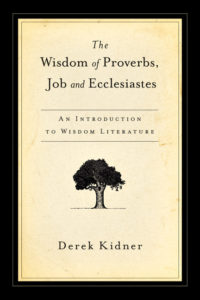People in the Chicago area where I live are amazed that the new pope, Leo XIV, grew up right here. Not only is he the first American pope—even better, he is a White Sox fan!
Yet a friend had quite a different reaction. He asked me, “Why are Protestants often enamored with the pope, sometimes it seems even more so than with the Reformers?” What about the scandals of recent history, he wondered, not to mention the power-hungry, money-hungry corruption of the Middle Ages? Shouldn’t we think again about all this?
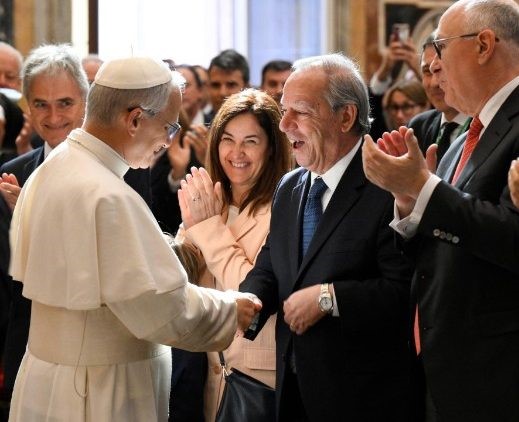
I appreciated his appeal to history. Too often we form opinions with complete disregard for how we as individuals and as a society have been profoundly shaped by the centuries. Yet I think there are good reasons for Protestants to not have such a negative view toward Catholicism. (Full disclosure: Though Presbyterian, I grew up Catholic and still have many Catholics in my family.)
First, in keeping with my friend’s concern for history and culture, Catholicism in America is a very different animal than in the rest of the world. My friend grew up in Protestant Europe where there has been religious persecution over the centuries. Sadly the violence has gone both ways. You also don’t have to go back too far in Latin American history to find instances of persecution of Protestants by Catholics. The recent troubles in Ireland have been more political and social than religious.
In the U. S., however, Catholicism has always been a minority. It never had the opportunity to dominate other religions as it did elsewhere. If there has been persecution and violence, it has gone the other way.
Also Catholicism has tended to accommodate itself to the largely Protestant culture of the U.S. One example: While Protestant and Catholic church buildings were very different from each other a century ago (both inside and out), today you can hardly tell the difference architecturally between new structures.
Even theologically, American Catholicism has over the decades reduced its emphasis on venerating Mary and the saints, softening the hard edges of differences with Protestants. Since the middle of the twentieth century especially, Catholicism also deliberately sought to make itself acceptable to the social and political American mainstream.
By this I do not mean to paper over differences that still exist regarding doctrine and ecclesiology. I’ve also written here about other hidden but important differences which often separate Catholics and Protestants. I am merely suggesting we aim for perspective and balance.
Second, when it comes to recent scandals, sadly Protestants and Catholics both share guilt. News of Southern Baptist sexual abuse and its coverup may be the most recent and widespread example within Protestantism, but it is not the only one. We have all failed to live up to our own standards and those of Scripture. We both need to confess and to reform dramatically.
Third, when considering the forces arrayed in the world against the moral and spiritual ethos of Scripture, Catholicism is just not very high on the list, if on the list at all. Materialism, consumerism, nationalism, racism, changes in attitudes toward sexuality—these have had a dramatic effect on Christians and the church.
In this regard, the Catholic Church is an ally or at least a cobelligerent. We should likewise welcome atheists or Hindus, politicians or corporate leaders who advocate as Jesus and the prophets did for the value of each human life, for the poor, for the politically oppressed, for peace and justice, and for the value and significance of spiritual realities in our world.
Differences between Catholics and Protestants? A difficult past? Much to forgive? Certainly. But we also have much in common to build on.
—
Photo Credit: Pope Lei XIV, Vatican News

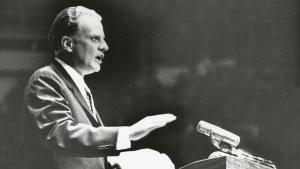 The word evangelical has a long history, going back about three hundred years in England to describe a movement intended to revive the token Christianity that was widespread at the time. In the mid-twentieth century, Billy Graham (who welcomed Catholics and African Americans) adopted the label to distinguish himself from fundamentalists. This latter group emerged in the early twentieth century, coming to national attention with the Scopes Monkey Trial of 1925. They believed the Bible was literal and inerrant, were doctrinally conservative, anti-science, and separated themselves from mainstream culture as well as from any believers who didn’t agree with them.
The word evangelical has a long history, going back about three hundred years in England to describe a movement intended to revive the token Christianity that was widespread at the time. In the mid-twentieth century, Billy Graham (who welcomed Catholics and African Americans) adopted the label to distinguish himself from fundamentalists. This latter group emerged in the early twentieth century, coming to national attention with the Scopes Monkey Trial of 1925. They believed the Bible was literal and inerrant, were doctrinally conservative, anti-science, and separated themselves from mainstream culture as well as from any believers who didn’t agree with them.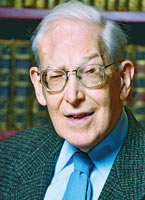 Once I recall him talking about his concise writing style. “Packer by name; packer by trade,” he responded. I could tell he enjoyed saying that, and I got the impression he used the line often.
Once I recall him talking about his concise writing style. “Packer by name; packer by trade,” he responded. I could tell he enjoyed saying that, and I got the impression he used the line often. 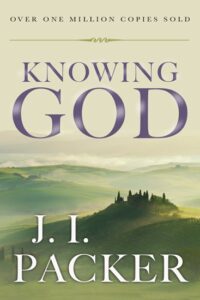 Once several of us took him to lunch, and as we ate IVP publisher Bob Fryling posed the question, “How would you describe IVP among the many Christian publishers that are around?”
Once several of us took him to lunch, and as we ate IVP publisher Bob Fryling posed the question, “How would you describe IVP among the many Christian publishers that are around?”  When we firmly, completely, uncompromisingly put our trust in a particular way of viewing the Bible, ironically we put ourselves at risk of disbelief. Why? Because if one brick of the structure we have built crumbles, then the whole edifice falls.
When we firmly, completely, uncompromisingly put our trust in a particular way of viewing the Bible, ironically we put ourselves at risk of disbelief. Why? Because if one brick of the structure we have built crumbles, then the whole edifice falls. 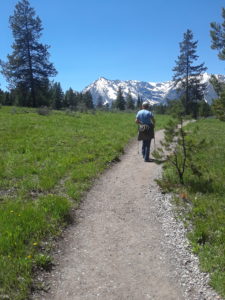 The emphasis on conversionism has had another effect. It has made evangelicals more individualistic than Catholics, who are oriented more toward the community of faith as a primary means for drawing closer to God. Certainly American individualism has had a tremendous impact on American Catholicism as well. American Catholics are much more willing, as mentioned earlier, to disagree with and act contrary to the Church’s teachings than Catholics in many other countries. Nonetheless, when it comes to spirituality, it is primarily a matter of the community.
The emphasis on conversionism has had another effect. It has made evangelicals more individualistic than Catholics, who are oriented more toward the community of faith as a primary means for drawing closer to God. Certainly American individualism has had a tremendous impact on American Catholicism as well. American Catholics are much more willing, as mentioned earlier, to disagree with and act contrary to the Church’s teachings than Catholics in many other countries. Nonetheless, when it comes to spirituality, it is primarily a matter of the community. I said, “The Road to Emmaus is a paradigm of Catholic spirituality, right? Spiritual growth is a journey that we go on. And Christ travels with us on this journey even though we may not know he is there. But we recognize him in the breaking of the bread, in the Eucharist. And our immediate instinct at such times of significant encounter with Christ is to go to the community, just as the two on the Road to Emmaus did. So we have in this paradigm the key elements of the journey, the presence of Christ, the Eucharist and the community that make up much of Catholic spirituality.”2 He looked completely bored, as if I were telling him the sun rises in the east and sets in the west.
I said, “The Road to Emmaus is a paradigm of Catholic spirituality, right? Spiritual growth is a journey that we go on. And Christ travels with us on this journey even though we may not know he is there. But we recognize him in the breaking of the bread, in the Eucharist. And our immediate instinct at such times of significant encounter with Christ is to go to the community, just as the two on the Road to Emmaus did. So we have in this paradigm the key elements of the journey, the presence of Christ, the Eucharist and the community that make up much of Catholic spirituality.”2 He looked completely bored, as if I were telling him the sun rises in the east and sets in the west. “Exactly. Spiritual growth happens in crisis events when we are suddenly thrust to a higher or deeper level of intimacy and commitment to Christ. From that moment we are radically changed. Spirituality proceeds dialectically. There is a radical discontinuity of the past from the future. Sometimes that moment is the crisis of conversion. Sometimes it is hearing a calling or some other new spiritual experience. So I think your Protestant friends may be expecting a Damascus Road experience.”
“Exactly. Spiritual growth happens in crisis events when we are suddenly thrust to a higher or deeper level of intimacy and commitment to Christ. From that moment we are radically changed. Spirituality proceeds dialectically. There is a radical discontinuity of the past from the future. Sometimes that moment is the crisis of conversion. Sometimes it is hearing a calling or some other new spiritual experience. So I think your Protestant friends may be expecting a Damascus Road experience.”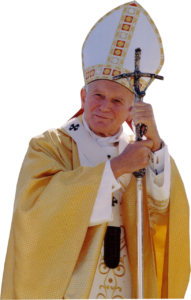 Catholics, by contrast, are very happy to think in terms of both/and. John Paul II was highly revered by Catholics, yet large majorities of Catholics (particularly in North America) felt perfectly at peace disagreeing with him on birth control, priestly celibacy and stem cell research. The inconsistency bothers them little.
Catholics, by contrast, are very happy to think in terms of both/and. John Paul II was highly revered by Catholics, yet large majorities of Catholics (particularly in North America) felt perfectly at peace disagreeing with him on birth control, priestly celibacy and stem cell research. The inconsistency bothers them little.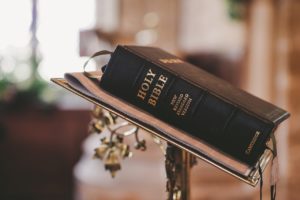 For evangelicals, the game is thought to be won or lost on statements. If we can’t have fixed truth expressed in words, we are subject to every wind of doctrine. We lack an anchor and may drift into heresy or at least into the shoals of liberalism. While Catholics lean toward analogical thinking, Evangelicals tend to embrace what Tracy calls the dialectical imagination. Since we have a tendency to deceive ourselves, we seek certainty. Symbols are too vague to achieve this. Propositions warn us clearly against error, set limits and call us back to truth.
For evangelicals, the game is thought to be won or lost on statements. If we can’t have fixed truth expressed in words, we are subject to every wind of doctrine. We lack an anchor and may drift into heresy or at least into the shoals of liberalism. While Catholics lean toward analogical thinking, Evangelicals tend to embrace what Tracy calls the dialectical imagination. Since we have a tendency to deceive ourselves, we seek certainty. Symbols are too vague to achieve this. Propositions warn us clearly against error, set limits and call us back to truth.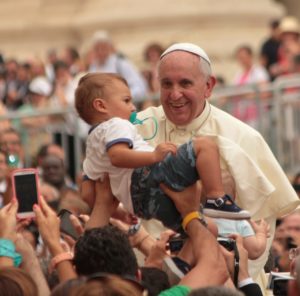 It could only have been someone with God’s sense of humor who had brought us together. But we both loved Jesus and each other, and assumed that was enough.
It could only have been someone with God’s sense of humor who had brought us together. But we both loved Jesus and each other, and assumed that was enough.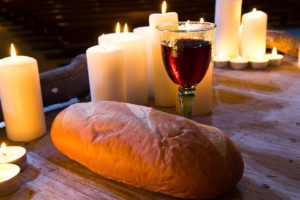 For Catholics, it was not the document at all that was primary. It was the community, the people of God, the unity of the people of God. If signing the document could help preserve that unity, by all means, sign it—and then do what your conscience requires.
For Catholics, it was not the document at all that was primary. It was the community, the people of God, the unity of the people of God. If signing the document could help preserve that unity, by all means, sign it—and then do what your conscience requires.